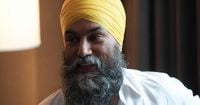In a significant political moment for Canada, the nation headed to the polls on April 29, 2025, amidst pressing national security concerns and trade tensions with the United States. The election outcome could have lasting implications for the country as voters cast their ballots in a contest that has seen a dramatic shift in the political landscape.
At the center of this contest are Prime Minister Mark Carney’s Liberal Party and Pierre Poilievre’s Conservative Party, both vying for control of the government. Recent polling data indicates a tight race, with Carney's Liberals holding a narrow lead at approximately 42.6% support compared to Poilievre’s Conservatives at 39.9%. Meanwhile, Jagmeet Singh’s New Democratic Party (NDP) trails significantly, positioned in third place, while the Bloc Quebecois holds fourth.
As the election unfolded, the NDP's role became increasingly crucial, especially if no party secures a clear majority in the House of Commons, which consists of 343 seats. Singh’s party could potentially play the role of kingmaker, influencing which party forms the next government. This situation stems from Singh's previous support of the Liberal government under Justin Trudeau, which he withdrew in September 2024 due to the Conservative Party's growing momentum.
However, the stakes are high for Singh and his party. Polls suggest that the NDP could lose official party status if they do not secure at least 12 seats. Singh, who has built his political persona around equity, inclusion, and social justice, now faces an uphill battle to maintain the NDP’s influence in Canadian politics. In his own riding of Burnaby Central, Singh is encountering stiff competition, with indications that he may be trailing behind the Liberals.
This newly established district, which replaced Burnaby South, was once held by Singh, but shifting dynamics suggest he may not secure a win this time. If Singh loses his seat, it would represent a significant setback for the NDP, potentially jeopardizing its relevance in future political discourse.
The campaign has also been shaped by the rhetoric of U.S. President Donald Trump, particularly his trade tariffs and controversial remarks regarding Canada. Trump's threats have heightened national security concerns, prompting many Canadians to rally behind Carney’s Liberal Party, which has positioned itself as a steady force capable of protecting Canada’s interests amid foreign pressures.
As the election results were being counted, the political atmosphere was charged with uncertainty. Canada’s parliamentary system is designed to handle minority governments, where no single party holds a majority. In such cases, the governing party must seek support from others to pass legislation, often leading to informal agreements or coalitions. If the government loses a vote of confidence, it may be forced to resign, leading to another election.
In the event of a minority government, Singh's NDP could play a pivotal role in determining the fate of the next government. Depending on the seat count, the NDP could choose to support either the Liberals or the Conservatives, or even withhold support altogether, which could lead to a legislative deadlock.
Singh has publicly stated he would not form a coalition government with the Liberals if no party wins a clear majority. His focus remains on advocating for NDP priorities, such as debt forgiveness for students, lowering prescription drug costs, and addressing climate change, rather than sharing power with the Liberals. This stance, while principled, could limit the NDP’s bargaining power in post-election negotiations.
The future of the NDP hangs in the balance, resting on its ability to maintain party status and secure enough seats to influence legislative outcomes. Should the party fail to achieve a substantial seat count, it may struggle to maintain its relevance in Canadian politics.
As the dust settles from this election, the implications of the results will become clear. If the NDP can secure a significant number of seats, Singh could play a critical role in shaping the direction of Canadian policy. Conversely, if the party falters, it may signal a shift in the political landscape, with the NDP's influence waning in the face of a more dominant Liberal or Conservative government.
In a recent discussion, CHCH News anchor Matt Ingram spoke with NDP strategist Kim Wright about the challenges Singh faced during his campaign amid declining support. Wright emphasized that the effectiveness of the NDP in Parliament could diminish if the party ends up with fewer seats, a sentiment echoed by many analysts observing the election.
As the election results are fully tallied, Canada will be watching closely to see how the political landscape evolves. The outcome will not only determine the future of the government but also the role of the NDP in a changing political environment. With Singh's future hanging in the balance, the stakes could not be higher for him and his party.





